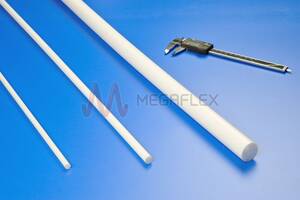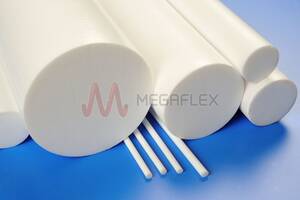Rigid Stress-Relieved Tight Tolerance Virgin PTFE Rod
Product Code: RPTFE-VGN-PG

Description
Thermal Properties
PTFE Rod is one of the most thermally stable plastic materials; there is no appreciable decomposition below 400°C. The arrangement of the PTFE molecules varies with temperature. There are different transition points, with the most important ones being 19°C corresponding to a modification of some physical properties, and then at 327°C which corresponds to the disappearance of the crystalline structure; the PTFE Rod assumes an amorphous aspect, conserving its own geometric form.
The linear thermal expansion coefficient varies with temperature. In addition, because of the orientation caused by the working process, the PTFE pieces are in general anisotropic; the coefficient of expansion varies also in relation to direction. The coefficient of thermal conductivity of the PTFE Rod does not vary with temperature; it is relatively high so that PTFE can be considered to be a good insulation material.
The specific heat, as well as the heat content (enthalpy) increases with the temperature.
Chemical Resistance
PTFE is practically inert against known elements and compounds. It is attacked only by the alkaline metals in the elementary state, by Chlorine Trifluoride, and by elementary fluorine at high temperatures and pressures. PTFE is insoluble in almost all solvents at temperatures ip to about 300°C. Fluorinated hydrocarbons cause a certain swelling which is however, reversible. Some highly fluorinated oils, at temperatures over 300°C exercise a certain dissolving effect upon PTFE.
Test pieces of PTFE exposed for over twenty years to the most disparate climate conditions have not shown any alteration of their characteristic properties. High energy radiation tends to cause the breaking of the PTFE molecule, so the resistance to radiation is rather poor. The permeability of PTFE is similar to other plastic materials.
Physical Properties
PTFE can be used continuously at 260°C while still possessing a certain compressive plasticity at temperatures approaching absolute zero. PTFE is quite flexible and does not break when subjected to stresses of 0.7 N/mm2 according to ASTM D 790. Flexural modulus is about 350-650 N/mm2 at room temperature. PTFE possesses very high resilience characteristics at low temperatures. The hardness is Shore D measured according to the method ASTM D 2240; values between D50 and D60.
PTFE possesses the lowest friction coefficients of all solid materials, between 0.05 and 0.09. Additional information can be found in the PTFE material sheets available from our sales office.
Food Quality
- Suitable for medical & pharmaceutical applications according to USP Class VI.
- Suitable for potable water: WRAS approved for drinking water applications.
- FDA regulations (Title 21 CFR 177.2600 Part E for aqueous foods).
- EU Regulation 10/2011 Food Simulant A: Hydrophilic Foods.
- EU Regulation 10/2011 Food Simulant B: Foods with pH <4.5.
- EU Regulation 10/2011 Food Simulant C: Alcohol up to 20%.
- EU Regulation 10/2011 Food Simulant D1: Alcohol content >20% and oil-in-water emulsions.
- EU Regulation 10/2011 Food Simulant D2: Foods with free fats at the surface.
- Suitable for alcohol up to 50%.
Temperature
- -200°C to 260°C
Certification
- UL 94 V0
- EU-Directive 10/2011
- EC 1935/2004
- EU 2005/1895
- EU 2023/2006
- FDA 21 CFR 177.1550
- DPR777
- DL108
- DM 34/73
- REACH
- RoHS
Applications
- Gaskets
- Valve stems
- O-rings
- Electrical insulators
- Liners
- Sealing rings
Suitable Media
- Acids
- Bases
- Solvents
- Gases
- Water
- Hydrocarbons
Construction
- Wall: PTFE
- Surface Finish: Smooth
Available Colours
- White
| Part | Outer Diameter | Length |
|---|---|---|
| RPTFE-VGN-PG/03.98-3 | 3.98 | 3 |
| RPTFE-VGN-PG/04.95-3 | 4.95 | 3 |
| RPTFE-VGN-PG/05.45-3 | 5.45 | 3 |
| RPTFE-VGN-PG/05.98-3 | 5.98 | 3 |
| RPTFE-VGN-PG/06.68-2 | 6.68 | 2 |
| RPTFE-VGN-PG/06.98-3 | 6.98 | 3 |
| RPTFE-VGN-PG/07.48-3 | 7.48 | 3 |
| RPTFE-VGN-PG/07.70-2 | 7.7 | 2 |
| RPTFE-VGN-PG/07.95-3 | 7.95 | 3 |
| RPTFE-VGN-PG/08.05-3 | 8.05 | 3 |
| RPTFE-VGN-PG/08.40-3 | 8.4 | 3 |
| RPTFE-VGN-PG/09.44-2 | 9.44 | 2 |
| RPTFE-VGN-PG/09.98-3 | 9.98 | 3 |
| RPTFE-VGN-PG/10.00-3 | 10 | 3 |
| RPTFE-VGN-PG/11.00-3 | 11 | 3 |
| RPTFE-VGN-PG/11.95-3 | 12.0 | 3 |
| RPTFE-VGN-PG/12.75-2 | 12.8 | 2 |
| RPTFE-VGN-PG/12.75-3 | 12.8 | 3 |
| RPTFE-VGN-PG/13.00-2 | 13 | 2 |
| RPTFE-VGN-PG/13.95-3 | 14.0 | 3 |
| RPTFE-VGN-PG/14.30-3 | 14.3 | 3 |
| RPTFE-VGN-PG/14.30-2 | 14.3 | 2 |
| RPTFE-VGN-PG/14.95-3 | 15.0 | 3 |
| RPTFE-VGN-PG/15.00-2 | 15 | 2 |
| RPTFE-VGN-PG/16.00-2 | 16 | 2 |
| RPTFE-VGN-PG/17.95-2 | 18.0 | 2 |
| RPTFE-VGN-PG/18.14-3 | 18.1 | 3 |
| RPTFE-VGN-PG/18.45-2 | 18.5 | 2 |
| RPTFE-VGN-PG/19.00-2 | 19 | 2 |
| RPTFE-VGN-PG/22.00-2 | 22 | 2 |
| RPTFE-VGN-PG/25.00-2 | 25 | 2 |
| RPTFE-VGN-PG/28.00-2 | 28 | 2 |
| RPTFE-VGN-PG/32.00-3 | 32 | 3 |
Please be advised; specifications assume standard room temperature unless otherwise specified. All data presented here is intended as a guide only; we are not responsible for errors or discrepancies in the specifications.
Please click here for full terms and conditions.
Please contact our sales office on 01636816612 for further details!
